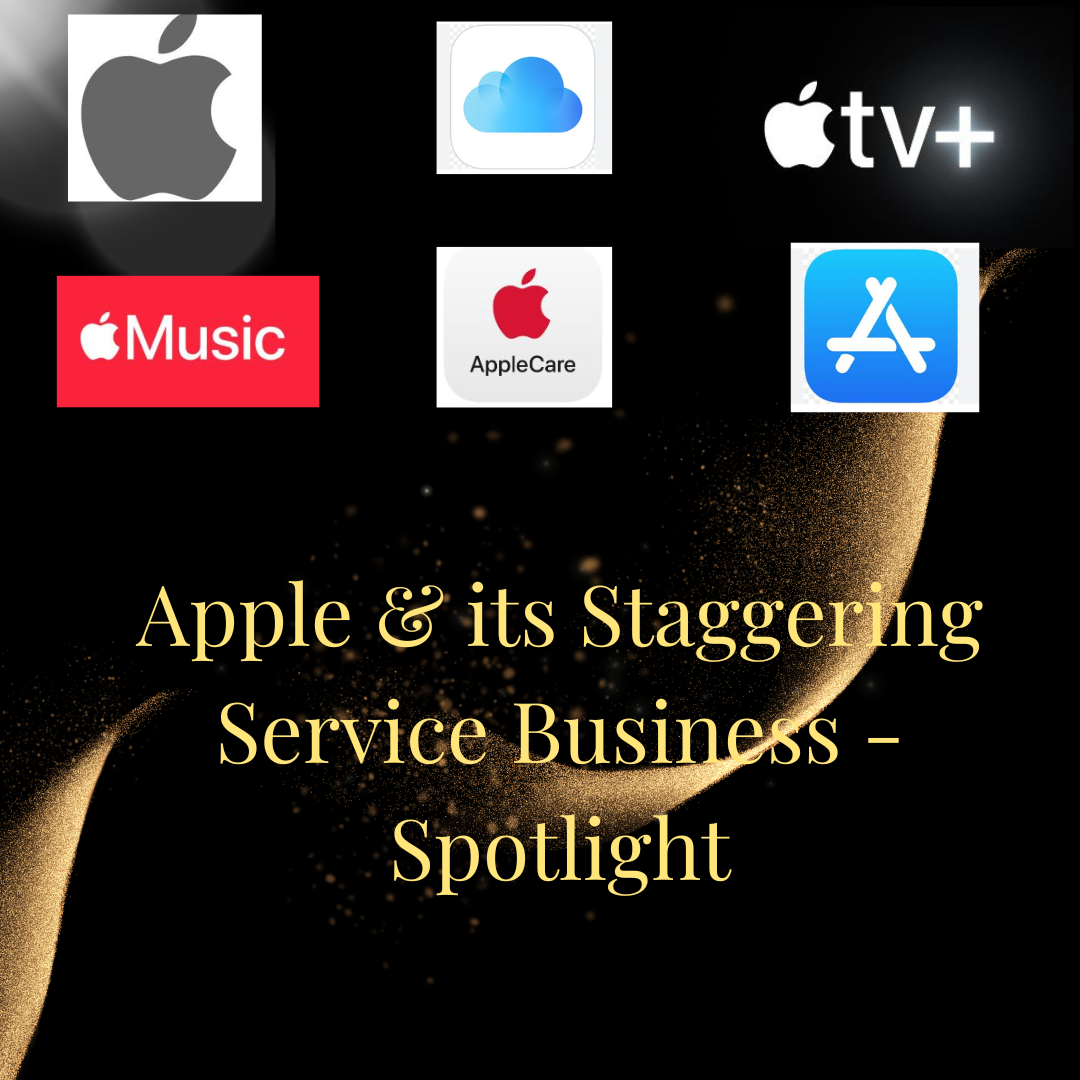
Apple & its Staggering Service Business
Apple & its Staggering Service Business – Spotlight.
Apple Stats & Facts

In 1976, Steve Jobs, Steve Wozniak, and Ronald Wayne founded Apple in the garage of Jobs’ parents. Their first product, called the Apple I, was a basic circuit board without many of the features found in modern computers, such as a display, keyboard, or mouse. Today, Apple offers a wide range of products and services, including the iPhone, iPad, Mac, wearables, home devices, and accessories. Under the leadership of former CEO Steve Jobs, Apple became known for its technical innovation, sleek designs, and creative marketing, making it one of the most valuable brands in the world. The company has a dedicated fan base and has experienced remarkable revenue growth, from just $8 billion in 2004 to over $270 billion in 2020.
Although Apple has been perceived as a hardware-focused company, it has significantly progressed in expanding its services sector in recent years. The motivation behind this strategy is apparent: as the technological advancements in smartphones, tablets, and other devices have slowed down, and replacement cycles have become longer, it has become increasingly challenging for Apple to sustain its high revenue levels or continue growing.
Apple & its Staggering Service Business

Apple recognized the value of services, which offer a steady and presumably high-profit margin revenue stream. With over two billion active devices in its installed base, it was a lucrative opportunity that Apple couldn’t overlook. Furthermore, the integration of Apple’s services with its hardware helps create customer lock-in by binding users to the company’s ecosystem. This loyalty is reinforced by the fact that customers can perform almost any task within Apple’s “walled garden,” making them less inclined to purchase non-Apple devices when upgrading their smartphones, laptops, tablets, or smartwatches.
Apple’s services segment, which includes the App Store, iCloud, Apple Care, Apple Music, Apple TV+, and Apple Pay, among others, is often underestimated due to the company’s hardware focus and its products dominating headlines. However, Apple’s services have grown into a sizable revenue generator. In the past year alone, Apple’s services segment brought in nearly $80 billion in revenue, surpassing the revenue of many Fortune 500 companies, such as Nike, Boeing, Coca-Cola, and McDonald’s. Although the iPhone business is still more significant, Apple’s services have become a noteworthy contributor to the company’s success.
Source: Statista
 You will find more infographics at Statista
You will find more infographics at StatistaApple Service Business
Apple & its Staggering Service Business include,
- App Store,
- iCloud,
- Apple Care,
- Apple Music,
- Apple TV+
- Apple Pay,
Apple App Store

The Apple App Store is a digital distribution platform developed by Apple Inc. for mobile applications on its iOS operating system. The App Store was launched in July 2008 and has since become the primary means of distributing mobile applications on Apple’s devices, including iPhones, iPads, and iPod Touches.
The App Store offers users access to millions of apps developed by third-party developers across a wide range of categories, including gaming, productivity, entertainment, social media, and more. Users can browse and search for apps, read reviews and ratings, and download and install them directly onto their devices.
Developers can create and distribute their apps on the App Store for a fee or share of revenue, depending on the type of app and its pricing model. Apple’s App Store Review Guidelines govern the approval process for apps, which must adhere to strict rules regarding content, functionality, and privacy.
In recent years, the App Store has come under scrutiny for its policies regarding app pricing, in-app purchases, and developer compensation. This has led to legal challenges and antitrust investigations in multiple countries. Nonetheless, the App Store remains a crucial part of the iOS ecosystem and a significant source of revenue for both Apple and app developers.
Apple iCloud

Apple iCloud is a cloud-based storage and computing service developed by Apple Inc. The service allows users to store, sync, and share data across multiple Apple devices, including iPhones, iPads, Mac computers, and Apple Watches.
With iCloud, users can store various types of data, such as photos, videos, documents, music, and app data. This data is automatically synced across all of a user’s devices, meaning that updates made on one device are instantly reflected on all other connected devices. This makes it easy for users to access their data from anywhere and on any device, without having to worry about manually transferring files or data.
In addition to storage and synchronization capabilities, iCloud offers several other features, including iCloud Drive, which allows users to access and manage their files from any device; iCloud Keychain, which securely stores and syncs passwords and other sensitive information; and Find My, which helps users locate lost or stolen Apple devices.
iCloud also provides a platform for developers to build cloud-based features and functionality into their apps, such as cloud storage, syncing, and sharing capabilities.
While iCloud is a useful service for Apple users, it has faced criticism for its limited storage capacity and high costs for additional storage. Nonetheless, iCloud remains a critical component of the Apple ecosystem, offering users a seamless and integrated experience across multiple devices
Apple Care

AppleCare is a service offered by Apple that provides technical support, hardware repairs, and software assistance for Apple products. The service is available for a wide range of Apple devices, including iPhones, iPads, Macs, and Apple Watches.
When customers purchase an Apple product, they are automatically enrolled in a limited warranty program that covers the device for one year. This warranty provides basic coverage for defects and hardware issues, but does not cover accidental damage or provide additional support beyond basic troubleshooting.
AppleCare offers extended warranty coverage beyond the standard one-year warranty. Customers can purchase AppleCare+ coverage for up to two additional years for eligible products, such as iPhones and iPads. AppleCare+ covers accidental damage, including screen damage and other hardware damage caused by drops or spills. For Macs, AppleCare Protection Plan offers up to three years of coverage.
In addition to extended warranty coverage, AppleCare offers technical support by phone, chat, or in-person at an Apple Store. This support includes assistance with setting up and using devices, troubleshooting issues, and guidance on software and hardware questions.
AppleCare is available for purchase at the time of device purchase or within a specific period after purchase. The cost of AppleCare varies depending on the product and level of coverage selected.
Overall, AppleCare provides peace of mind and additional support for Apple products, and has contributed to Apple’s reputation for excellent customer service and support.
Apple Music

Apple Music is a music streaming service developed by Apple Inc. that provides access to millions of songs, playlists, and radio stations. The service was launched in 2015 and is available on a variety of Apple devices, including iPhones, iPads, Macs, Apple Watches, and Apple TV.
Apple Music offers a library of over 75 million songs that can be streamed or downloaded for offline listening. Users can create and share playlists, and the service provides personalized recommendations based on listening history and preferences. Apple Music also features exclusive content, such as live concerts and interviews with artists.
In addition to music, Apple Music offers access to Beats 1, a global radio station that broadcasts live shows hosted by DJs and music experts. Users can also access a range of other radio stations and podcasts within the Apple Music app.
Apple Music is available through a subscription model, with individual and family plans offered. The service also offers a student discount. Subscribers can access Apple Music on multiple devices and share their subscription with up to six family members.
Apple Music has become a major player in the music streaming industry, competing with other services such as Spotify and Amazon Music. The service has contributed to Apple’s growing services business, which has become an important source of revenue for the company in recent years
Apple TV+

Apple TV+ is a subscription-based streaming service launched by Apple Inc. in 2019. The service features original content produced by Apple, including TV shows, movies, and documentaries. The service is available on a range of devices, including Apple TV, iPhones, iPads, and Macs.
Apple TV+ offers a growing library of original programming, with new content added regularly. The service features award-winning shows such as “The Morning Show,” “Ted Lasso,” and “For All Mankind,” as well as movies and documentaries.
One of the unique features of Apple TV+ is its emphasis on quality over quantity. Unlike some other streaming services, Apple TV+ does not have a vast library of content from other studios and networks. Instead, the service focuses on producing high-quality original programming that is exclusive to Apple TV+.
Apple TV+ is available through a subscription model, with a free trial period offered to new users. The service is also included in the Apple One bundle, which provides access to multiple Apple services for a monthly fee.
Apple TV+ has received positive reviews for its original programming and high production values. The service has helped to establish Apple as a serious player in the streaming industry and is part of the company’s broader strategy to grow its services business.
Apple Pay
Apple Pay is a digital payment system developed by Apple Inc. that allows users to make secure payments using their Apple devices. The service was launched in 2014 and is available on a range of devices, including iPhones, iPads, and Apple Watches.
Apple Pay works by storing the user’s credit or debit card information on their Apple device. When making a payment, the user can hold their device near a contactless payment terminal and use their fingerprint, face ID, or passcode to complete the transaction. The system uses tokenization to protect the user’s card information and ensure the security of the transaction.
In addition to in-store payments, Apple Pay can also be used to make online purchases and send or receive money through the Messages app. The service supports a range of credit and debit cards from major banks and financial institutions.
One of the advantages of Apple Pay is its convenience and ease of use. Users can store multiple cards on their device and switch between them when making a payment. The system also provides a record of transactions and can be used to track spending.
Apple Pay has become an increasingly popular payment method, with millions of users worldwide. The service has contributed to the growth of Apple’s services business and is part of the company’s broader strategy to expand its offerings beyond hardware devices
Conclusion – Apple & its Staggering Service Business
In recent years, Apple has made significant efforts to expand its services business, which has become an increasingly important part of the company’s overall strategy. While Apple is primarily known as a hardware company, its services segment includes a range of offerings such as the App Store, iCloud, Apple Care, Apple Music, Apple TV+, and Apple Pay, among others.
Apple’s services business has become a significant source of recurring revenue, with more than 660 million paid subscriptions across all of its services as of Q3 2021. In the past year alone, Apple’s services segment generated nearly $80 billion in revenue, making it one of the largest service providers in the world.
One of the reasons for the company’s services push is the changing landscape of the technology industry. As the market for smartphones, tablets, and other devices has matured, the replacement cycles for these products have become longer, making it harder for Apple to maintain or grow its revenue through hardware sales alone. By developing and expanding its services offerings, Apple has been able to create a more predictable revenue stream and strengthen customer loyalty by providing a more comprehensive ecosystem of products and services.
Apple’s services also help to enhance the user experience by offering seamless integration with its hardware products. For example, iCloud enables users to store and sync data across multiple devices, while Apple Music provides a seamless streaming service for users across all of their Apple devices. Overall, Apple’s services segment has become an essential part of the company’s business model, contributing to its continued success and growth in the technology industry.

Visit more news on this site: The Dramatic Ascent and Devastating Plummet of Gautam Adani




